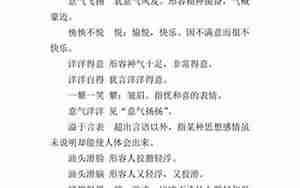
英语反意疑问句的易错点和考点
关于反义疑问句,大家都知道“前肯后否”和“前否后肯”原则,但是我们不能简单地认为只要看到 “not”, "no"等才是否定,不能被表面现象迷惑。全面掌握反意疑问句,还必须牢记一句话,那就是:
反意疑问句口诀
下面是对这句口诀的详解:
考点注意事项1、陈述部分是I am时,疑问部分要用 aren't I ?
eg: I am as tall as your sister,aren't I?
2、Let's 开头的祈使句,后用shall we(否定用shan't we) ?
而Let us 开头的祈使句,后用will you (否定用won't you)?
eg: Let's go to the school, shall we(或否定shan't we)?
Let us wait for you , will you (或否定won't you)?
3、当陈述部分主语是指示代词或不定代词时,如everything, that, nothing, this等, 疑问部分主语用it。
eg: Everything is ready, isn't it?
4、陈述部分是"there be"结构的,疑问部分用 there
eg: There will not be any trouble, will there?
There is something wrong with your watch, isn't there?
知识延伸1、如果陈述部分的否定词带有否定前缀或后缀,那么,该陈述部分应该作肯定处理,疑问部分一般仍然用否定形式。
eg: He was unsuccessful, wasn't he?
2、反意疑问句中,如果陈述部分带有seldom(很少),hardly(几乎不),never(从不),rarely(不常,很少),few(没多少,几乎没有),little(没多少,几乎没有),nothing(什么都没有)以及含“too...to”等否定词或者半否定词时,疑问部分的动词要用肯定形式。
eg: Few people know him, do they?
以上列举的注意事项,希望对大家有所帮助。
英语反意疑问句的易错点和考点
关于反义疑问句,大家都知道“前肯后否”和“前否后肯”原则,但是我们不能简单地认为只要看到 “not”, "no"等才是否定,不能被表面现象迷惑。全面掌握反意疑问句,还必须牢记一句话,那就是:
反意疑问句口诀
下面是对这句口诀的详解:
考点注意事项1、陈述部分是I am时,疑问部分要用 aren't I ?
eg: I am as tall as your sister,aren't I?
2、Let's 开头的祈使句,后用shall we(否定用shan't we) ?
而Let us 开头的祈使句,后用will you (否定用won't you)?
eg: Let's go to the school, shall we(或否定shan't we)?
Let us wait for you , will you (或否定won't you)?
3、当陈述部分主语是指示代词或不定代词时,如everything, that, nothing, this等, 疑问部分主语用it。
eg: Everything is ready, isn't it?
4、陈述部分是"there be"结构的,疑问部分用 there
eg: There will not be any trouble, will there?
There is something wrong with your watch, isn't there?
知识延伸1、如果陈述部分的否定词带有否定前缀或后缀,那么,该陈述部分应该作肯定处理,疑问部分一般仍然用否定形式。
eg: He was unsuccessful, wasn't he?
2、反意疑问句中,如果陈述部分带有seldom(很少),hardly(几乎不),never(从不),rarely(不常,很少),few(没多少,几乎没有),little(没多少,几乎没有),nothing(什么都没有)以及含“too...to”等否定词或者半否定词时,疑问部分的动词要用肯定形式。
eg: Few people know him, do they?
以上列举的注意事项,希望对大家有所帮助。
英才教育网络薛立新导师:反义疑问句回答方法歌诀
回答反意疑问句,
答案含义是依据,
肯定事实用 yes,
否定事实 no 替。
【说明】
对反意疑问句的回答,不管问题的提法如何,如果事实是肯定的,就要用 yes,事实是否定的,就要用 no。这和汉语不一样,应特别注意。如:
Heisn'tgoingtothemeeting,ishe?他不去参加会议,是吗?
Yes,he is.不,他要去的。
No,he isn't.对,他不去。
Exercise:
选择填空。
1.The teacher had a word with you,_____ ?
A.didn't he B.hadn't heC.didn't have he D.did not he
2.You won't take back what you said._____ ?
A.didn't you B.will youC.aren't you D.were you
3.Let's go to watch the football match,_____ ?
A.do we B.don't weC.shall we D.will you
4.Your family has no colour TV set,_____ ?
A.hasn't it B.doesn't itC.is it D.has it
5.—Miss Li doesn't like dancing,does she?—___________.
A.No,she does B.No,she doC.Yes,she does D.Yes,she is
6.There's something wrong with the radio,_____ ?
A.hasn't there B.doesn't thereC.isn't there D.is there
Key:1.A 2.B 3.C 4.D 5.C 6.C




























